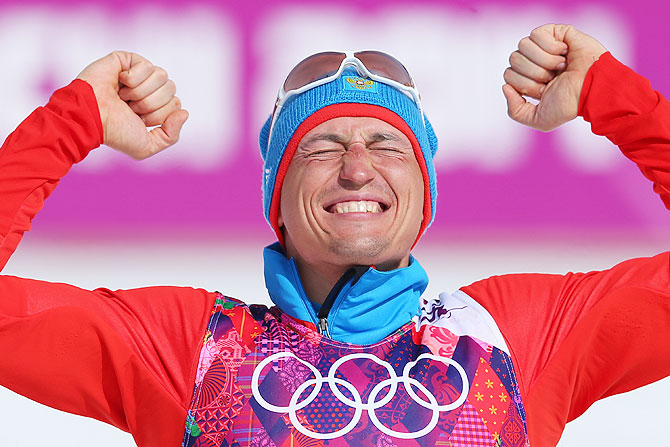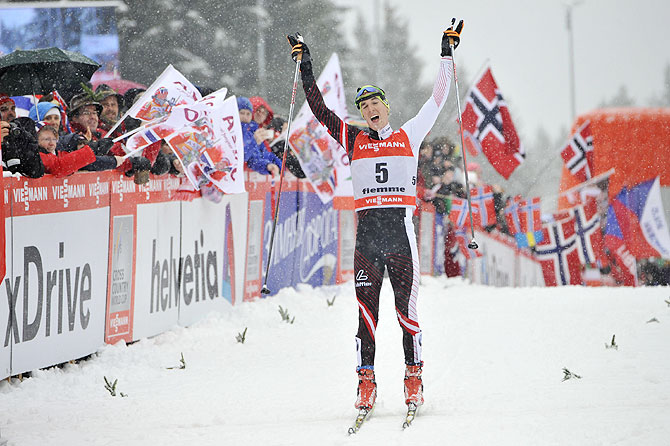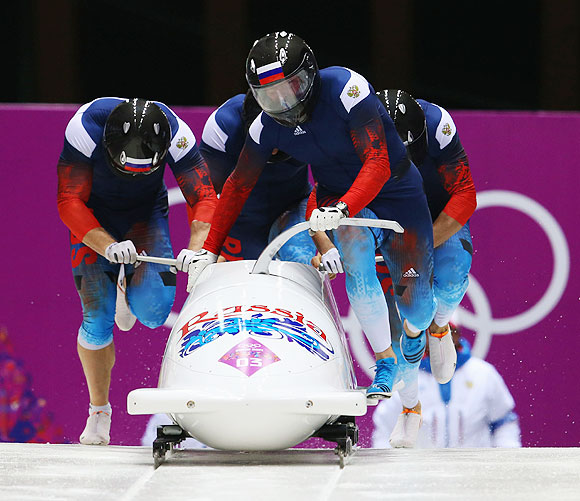
The Winter Olympics will end on Sunday with Russia on top of the medals table in a surprise sporting success for the host nation, but news that a fifth Sochi athlete tested positive for a banned substance dimmed the golden glow.
With two of 98 medals yet to be decided ahead of the evening closing ceremony on the Black Sea coast, Russia has 12 gold medals after a podium sweep in the 50km mass start cross-country race brought loud cheers in the mountains.
Organisers will be delighted that athletic achievement has gone hand-in-hand with a generally well-run Games, so far untouched by violence at the hands of Islamist militants opposed to President Vladimir Putin and his pet project.
Voices of dissent over Russia's human rights record, particularly regarding legislation that critics say discriminates against gays, have occasionally crashed the party, but attention has largely focused on sport.
One of the biggest contests is yet to come -- the men's ice hockey final in the early evening between defending champions Canada and 2006 Olympic winners Sweden.

That is followed by the closing ceremony at the Fisht Stadium, one of several gleaming new arenas built in Sochi that helped push the price tag for Russia's first Winter Games to an estimated $51 billion, a record for any Olympics.
Only time will tell if the project, on which Putin has staked much of his prestige, was worth it, as Russia faces the formidable challenge of turning Sochi and the surrounding areas into a year-round sports and entertainment hub.
But for now Russian officials are basking in the glory of an event they believe has helped them build bridges with the West, with which Moscow has had uneasy relations under Putin.
"The friendly faces, the warm Sochi sun and the glare of the Olympic gold have broken the ice of scepticism towards the new Russia," Deputy Prime Minister Dmitry Kozak, also Putin's Olympics organiser, said at the weekend.
"The Games have turned our country, its culture and the people into something that is a lot closer and more appealing and understandable for the rest of the world."

Less appealing was news that two more athletes had failed doping tests, taking to five the number of competitors caught during Sochi compared with one in Vancouver.
In the latest case, Austrian cross-country skier Johannes Duerr, who placed eighth in the skiathlon, tested positive for performance-boosting EPO and has been excluded from the Games, according to the Austrian Olympic Committee.
"I am shocked," Austrian Olympic chief Karl Stoss said.
Latvian men's ice hockey player Vitaljis Pavlovs was also thrown out of the Olympics on Sunday after he tested positive for methylhexaneamine.
German biathlete Evi Sachenbacher-Stehle, Italian bobsleigh athlete William Frullani and Ukraine's cross-country skier Marina Lisogor were all caught doping.
The International Olympic Committee is conducting a record 2,500 doping tests in Sochi.

The first contest of the day was at the Laura cross-country complex in the Caucasus Mountains above Sochi, where the men's home team swept the medals in a test of endurance held in bright sunshine.
Russia's Alexander Legkov was the winner, confirming Russia as the most successful nation at the Sochi Games -- a result few would have predicted after it came only 11th in Vancouver in 2010 with just three golds.
The penultimate title to be decided is the four-men bobsleigh at the Sanki Sliding Centre, with the Russian quartet led by Alexander Zubkov enjoying the slenderest of leads going into the final two heats.
The only regret for the home fans is that their men will not be contesting arguably the most coveted medal of all in Sochi -- ice hockey.
Although the Swedes and Canadians cannot claim a classic rivalry, their ice hockey pedigrees are undisputable, producing some of the world's top talent.
The two countries are equally passionate about the sport and from Saskatoon to Stockholm people will stop to gather around televisions and watch the drama unfold.
"It's such an honour to have an opportunity to coach these teams, and you have to take your responsibility to your country and to hockey very seriously," Canadian coach Mike Babcock told reporters.
"Having said that, and people don't ever believe me, but you have to line up the moon and skies to win. People don't always believe that in Canada but it's the facts."
Victory on Sunday would give Canada a sweep of the ice hockey gold medals for a second consecutive Olympics. The women stormed back from 2-0 down in the last four minutes versus the United States to break American hearts on Thursday.